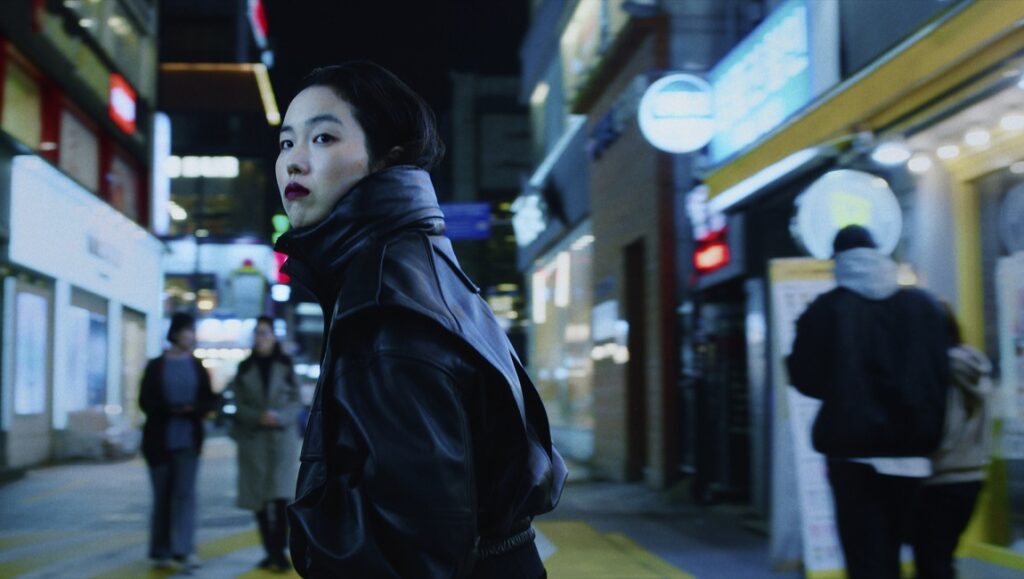Return to Seoul is a film guided by its director’s steady hand, boasting a generous script and tethered to a fantastic lead performance.
A hurried glance through the plot description of Return to Seoul might lead you to mistake its plot trajectory for the following: a young woman travels to a country she’s never been to in an effort to find her biological parents, processes the difficult encounter over the course of her brief visit, and ultimately returns home forever altered by the experience. The film you’re probably picturing with its facile emotional arc, climactic encounter at its fulcrum, and an elliptical sigh of an epilogue might resemble the backbone of many an indie middlebrow before it, but this is not what Cambodian-French director Davy Chou has brought to the table. This is all to say that like its central heroine, Return to Seoul is unpredictable and flighty, charismatic and cutting, a film that flows from days to weeks to years with such bravado that you start to wonder why more won’t do the same. This particular edge, separating it from the pack, is encapsulated in its original title, All The People I’ll Never Be, which becomes a skeleton key for unlocking its deeper ambiguities. Chou moves past the obvious heart of the matter, the immutable longing for, and alienation from, one’s country of origin, and instead tracks the way these foundational ideas of identity flow and shift across time. The people that our protagonist Freddie will never be include both the unrealized versions of herself that would have grown up in her homeland, as well as the shifting versions of herself that manifest across the film’s runtime.
We first meet the young and headstrong Freddie, short for Frederique, on her arrival in Seoul, a decision made seemingly at random after a canceled flight to Japan, and yet one that fits neatly within her rubric of behavior as quickly outlined early on. Freddie, drinking with two new friends, talks about sight-reading as having to “analyze the music in one glance, evaluate the danger, and jump in,” right as she gets up for a demonstration of the concept, grabbing a bottle of soju, and swiftly maneuvering over to introduce herself to a table of strangers. Chou films this sequence with comparable swagger, as the camera swings alongside Freddie’s movements through the restaurant and an infectious backbeat kicks in. The lesson here is that Freddie is spontaneous, magnetic, and not above fleeing uncomfortable conversations — the subject of her adoption came up right beforehand — with charismatic flourish. It’s astounding to learn that Park Ji-min, who plays her, is an artist who has never acted prior. Park executes this manic balancing act, between Freddie’s intense introspection and her exuberant abandon, with such ease that it’s bewildering, never mind how the natural charm emanating from her mischievous grin has a gravitational pull of its own.
This fearless “jumping in” is the driving force of the plot, leading Freddie — described by her new friends as having “classically Korean features,” yet limited knowledge of the language and culture having grown up in Paris — to turn a spontaneous three-day trip into two weeks, and subsequently into two years. Whether she had always intended, even if subconsciously, to seek out her biological parents is unclear; what matters is the feverish domino effect that leads her to them. This central narrative, based on the experiences of a close friend, is so clearly personal for Chou, who despite not being adopted is the son of Cambodian immigrants to France and had not visited his ancestral homeland of Cambodia until his mid-twenties. Since then, the country has remained pivotal to the films of the young director, from his documentary Golden Slumbers, which sought to revive the memory of the vibrant Cambodian film industry of the sixties, to his first narrative feature Diamond Island, capturing the day-to-day lives of youth in Phnom Penh. Chou outlines the complex interplay of culture and identity as Freddie collides with the more traditional patriarchal household of her biological father and his family. But it’s the final domino, the absence of her biological mother, that guides the tumultuous sequence of events of the second half, arcing across years like an improvised musical passage, and breaking past the tight constraints of lesser scripts, all the while guided by Chou’s steady hand, awash in neon, and tethered to Park’s forthright performance as ballast.
Originally published as part of Cannes Film Festival 2022 — Dispatch 2.


Comments are closed.